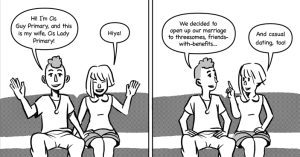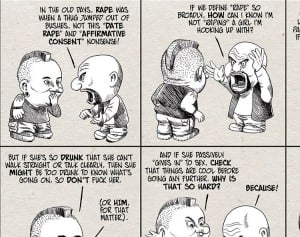
A tired person in a robe looking at a computer screen with their hand over their face. Source: Young Mommy Life
When social justice pages and forums discuss issues in pop culture, such as cultural appropriation by major celebrities and the Macklemore issue, one response always pops up:
“Why are you discussing this when children are starving in Africa? This is not important. First world problems!”
Sometimes people will say that feminists should focus on women’s rights violations in the Middle East instead of tackling the pay gap. When Duck Dynasty’s Phil Robertson made homoantagonistic remarks, the comment section on a number of US-based news pages echoed a similar sentiment: “Well, at least you’re not in Uganda right now.”
When prominent feminist pages discussed the media reaction to Miley Cyrus’s performance at the VMAs, commenters said that we should stop discussing that and instead discuss “real” misogyny in other parts of the world.
Although the wording changes, the central message is the same: The issue you’re discussing isn’t important because others – usually people in developing countries – are suffering.
These comments might be well-intended, but ultimately they perpetuate different forms of oppression.
Not only do comments like this derail important conversations – they appropriate suffering in developing countries to avoid being introspective about one’s own culture.
An Important Distinction to Make
It’s important that we criticize the media for not covering important issues.
For example, it is really annoying that a number of news pages and magazines would cover the Kimye wedding while examples of systemic oppression go unnoticed every day.
But there is quite a difference between criticizing media coverage and derailing discussions about the social implications of pop culture.
So, if a newspaper devotes four pages to covering the Kimye wedding because it’s Kimye, we should critique it in that there are definitely more important things to talk about.
On the other hand, if a newspaper talks about how the Kimye wedding and how we talk about it is representative of a systemic bias towards success in a capitalist system, for example, then it is something that is also worth talking about because it impacts how people think and act.
The distinction is the type of media coverage you’re criticizing.
To avoid derailing an important discussion, ask yourself one important thing before criticizing the media coverage: Is this article or discussion perpetuating oppression or tackling oppression?
Why Belittling ‘First World Problems’ Is Unhelpful
I write this from the perspective of someone living in an African country while enjoying more privileges than most Africans.
I’ve lived in lower-middle class areas of Cape Town, South Africa for most of my life, but economically I’m better off than most people living in my country. I’m also white, which means I experience a privilege that most Africans do not.
I am not attempting to speak on behalf of Africans or on behalf of all people in developing countries. These people can and do speak for themselves.
I speak as someone who is infuriated at the fact that their voices are being ignored.
I speak as someone who is tired of seeing their continent’s suffering appropriated by people who desperately want to ignore the oppression that’s happening outside their own front door.
So I think it’s time we tackle this.
1. Developed countries have an extensive impact on other countries.
Don’t underestimate the impact that the hegemonic culture has on subservient cultures.
Mainstream Western cultures are privileged – representations of people living in developed countries (particularly the US and UK) dominate the media and pop culture, even in developing countries.
These representations usually center on the lifestyles of white, middle- to upper-class people. As such, this is the hegemonic, privileged culture.
Because of better representation in the media, this culture has a huge impact on other cultures.
Pop culture and the media both reflect and perpetuate oppressive systems. When the media we see reflects your oppressive behavior, it perpetuates those oppressions in our spaces.
Your misogyny filters down to us. Your cissexism filters down to us. Your heterosexism filters down to us. Your racism filters down to us.
Let’s not forget that most of the developing world’s problems stem from colonization. This is a direct example of unchallenged oppressive attitudes in developed countries leading to oppression in developing countries.
So it is important to discuss and challenge oppressive attitudes in developed countries, especially those reflected in the media.
Challenging the representation of rape in pop culture is important in challenging rape culture globally. It’s important to challenge the objectification of women in the media in order to challenge global systemic sexism.
It’s important to challenge homoantagonistic attitudes in the media because it contributes to the global system of heterosexism. American right-wing religious leaders, for example, were hugely influential in the implementation of homoantagonistic laws in Uganda.
Tackling media representation is definitely not the only action that needs to be taken to challenge oppression in developing countries, but it’s definitely an important action.
When a person from a developed country passes off criticism of their culture as “first world problems”, they’re essentially ignoring the fact that developed countries have a profound effect on developing countries.
This attitude demonstrates an ignorance of one’s own Western privilege. It is ironic that people who claim they want to “help” people in less developed countries are refusing to acknowledge that privilege and use their position to actually help developing countries.
2. Don’t ignore the fact that your country isn’t perfect.
We often tend to think of oppression as something others do.
Although we’re all complicit in some form of oppression, we try to avoid taking responsibility for it. This sort of attitude leads to very little growth and change.
This is problematic because privileged classes, having control over mainstream narratives, are able to propagate stereotypes of marginalized classes as violent and oppressive.
Another example of this is the stereotype of black or African men being violent and sexually aggressive – a colonial-era notion which is still perpetuated through the media today.
The irony, of course, is that men of colour have been presented as violent and oppressive while white men – who violently colonized most of the planet – have no similar stereotype attached to them.
Relations between developed and developing countries are strongly related to the legacy of colonization and white imperialism.
Saying “But there are starving children in Africa!” without paying attention to what’s happening in your own backyard perpetuates the idea that oppression is something only other (read: marginalized) groups do.
There are starving children in Africa for sure, but, owing to racist and classist policies, there are starving children in the US, too.
The recently introduced homoantagonistic legislature in Nigeria and Uganda is certainly worthy of the world’s attention, but let’s not forget that queer people – especially queer and trans people of color – in the US are often victims of violent hate-crimes.
The suffering of people in developed countries does not shrink because people in developing countries are suffering. Because of this, conversations about oppression in developed countries shouldn’t stop.
We shouldn’t stop pointing out the cause of suffering just because other suffering is perceived to be greater.
The oppressive kyriarchy is something we are all complicit in, whether we like it or not.
We should call it out when we see it in others, but more importantly, we should fight against it when we see it in ourselves. This includes calling out oppression in your own culture and country.
3. Africa is a continent, not a derailment tactic.
The most infuriating aspect of this all is that the people who dismiss “first-world problems” in this manner do not truly care about “third world problems.”
Do you really care about the children who are starving in Africa? Do you discuss the cause of their suffering in the threads you aim to derail? Or are you using their suffering as an excuse to avoid discussing other things?
I also have a problem with the very examples that are given. They demonstrate a shallow knowledge of other countries and regions while reinforcing tired stereotypes.
Starving children in Africa? Oppressed Muslim women in the Middle East? You couldn’t choose a more typically Western-propagated stereotype.
Africa was ravaged by colonizers. Africa’s natural resources were abused and its people were displaced, enslaved, and dehumanized.
Using that history as an excuse to avoid being introspective about one’s own culture is appropriative and extremely insensitive.
***
Developing countries – like developed countries – have problems and difficulties. All difficulties are valid, all difficulties can be painful, and all difficulties are worth discussing.
But no difficulty should be used to avoid having potentially difficult discussions – human experiences are not derailment tactics.
[do_widget id=”text-101″]
Want to discuss this further? Visit our online forum and start a post!
Sian Ferguson is a Contributing Writer at Everyday Feminism. She is a South African feminist currently studying toward a Bachelors of Social Science degree majoring in English Language and Literature and Gender Studies at the University of Cape Town. She has been featured as a guest writer on websites such as Women24 and Foxy Box, while also writing for her personal blog. In her spare time, she tweets excessively @sianfergs, reads about current affairs, and spends time with her gorgeous group of friends. Read her articles here.
Search our 3000+ articles!
Read our articles about:
Our online racial justice training
Used by hundreds of universities, non-profits, and businesses.
Click to learn more




















